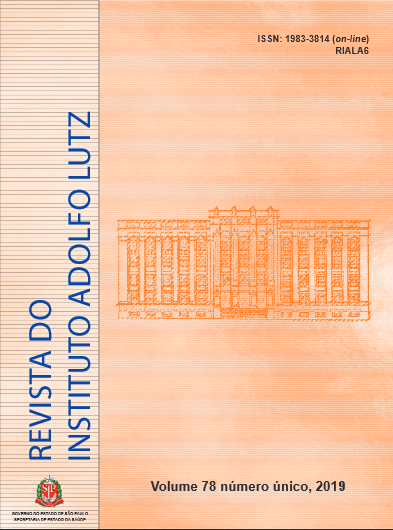Nutrition students beliefs on the nutritional information and nutritional claims in the pre-packaged food products: an application of the Theory of Planned Behavior
Resumo
O trabalho teve como objetivo identificar as crenças modais salientes comportamentais, normativas ede controle sobre o uso do rótulo nutricional de produtos alimentícios entre estudantes universitários.Em novembro de 2015, 19 estudantes de nutrição participaram de pesquisa qualitativa exploratória,que abordou conceitos da Teoria do Comportamento Planejado. Foram realizadas a análise deconteúdo de dois grupos focais e a análise estatística descritiva das variáveis quantitativas. Ambosos grupos focais mencionaram vantagens do uso de informações nutricionais, como auxílio narealização de escolhas de alimentos saudáveis. Uma desvantagem específica associada às alegaçõesnutricionais mencionada, foi a influência desta na decisão de compra (crenças comportamentais). Osalunos mencionaram seus pais e irmãos como pessoas que aprovam o uso dessa informação, quandocompram um produto (crenças normativas). Quanto às letras pequenas e à dificuldade de interpretaro tamanho das porções, na informação nutricional nos rótulos, foram fatores que poderiam dificultaro uso. Em relação às alegações nutricionais, por serem fáceis de ler, tenderam a estimular as decisõesde compra (crenças de controle). Foram identificadas 11 crenças modais salientes, que podemexplicar o comportamento dos participantes ao usar a informação e as alegações nutricionais.Referências
World Health Organization - WHO. Food
and Agriculture Organization of the United
Nations - FAO. Food labelling. 5.ed, Rome:
WHO/FAO; 2007. Available in:http://www.fao.
org/docrep/010/a1390e/a1390e00.htm
Temple NJ, Fraser J. Food labels: a critical
assessment. Nutrition. 2014, 30(3):257-60.
https://doi.org/10.1016/j.nut.2013.06.012
Hawkes C. Nutrition labels and health
claims: the global regulatory environment.
Genebra: World Health Organization; 2004.
Available in: http://apps.who.int/iris/
bitstream/10665/42964/1/9241591714.pdf
Christoph MJ, An R, Ellison B. Correlates of
nutrition label use among college students and
young adults: a review. Public Health Nutr.
;19(12):2135-48. https://doi.org/10.1017/
S1368980015003183
Fishbein M, Ajzen I. Predicting and
changing behavior: the reasoned action
approach. 1.ed New York: Psychology Press.
Taylor & Francis group; 2010. https://doi.
org/10.4324/9780203838020
Conner M, Sparks P. Theory of Planned Behaviour
and Health Behaviour. In: Conner M, Norman P,
editors. Predicting Health Behaviour. 2.ed. New York:
Open University Press; 2005. p. 170-222. Available in:
https://soh.iums.ac.ir/uploads/32_282_44_13.pdf
Kitzinger J. Focus groups with users and providers
of health care. In: Pope C, Mays N, editors.
Qualitative Research in Health Care. 2.ed. London:
BMJ Books; 2000. p. 20-29.
Brazilian Market Research Association. Brazilian
Economic Classification Criteria. 2015 and social
class distribution update for 2016. Available in: www.
abep.org/Servicos/Download.aspx?id=13
Gagné C, Godin G. Les théories sociales
cognitives: guide pour la mesure des variables
et le développement de questionnaire.
Québec: Bibliothèque Nationale. 1999.
Available in: https://pdfs.semanticscholar.or
g/0e2b/2f92f199f9f6939fb7b0bde04c80856c
a90e.pdf
Besler HT, Buyuktuncer Z, Uyar MF. Consumer
understanding and use of food and nutrition
labeling in Turkey. J Nutr Educ Behav.
;44(6):584-91. https://doi.org/10.1016/j.
jneb.2012.01.005
Fraiz GM, Bertin RL, Medeiros CO. Nutrition students beliefs on the nutritional information and nutritional claims in the pre-packaged food
products: an application of the Theory of Planned Behavior. Rev Inst Adolfo Lutz. São Paulo, 2019;78:e1772.
/9 Publicação contínua on line: número de páginas sem efeito para citação
On line continuous publishing: page number not for citation purposes
Fraiz GM, Bertin RL, Medeiros CO. Nutrition students beliefs on the nutritional information and nutritional claims in the pre-packaged food
products: an application of the Theory of Planned Behavior. Rev Inst Adolfo Lutz. São Paulo, 2019;78:e1772.
Cooke R, Papadaki A. Nutrition label use mediates
the positive relationship between nutrition
knowledge and attitudes towards healthy eating
with dietary quality among university students in
the UK. Appetite. 2014;83:297-303. https://doi.
org/10.1016/j.appet.2014.08.039
Wahlich C, Gardner B, McGowan L. How, when and
why do young women use nutrition information on
food labels? A qualitative analysis. Psychol Health.
;28(2):202-216. https://doi.org/10.1080/088
2012.716439
Miller LM, Cassady DL. The effects of nutrition
knowledge on food label use. A review of the
literature. Appetite. 2015;92:207-16. https://
doi.org/10.1016/j.appet.2015.05.029
Hodgkins CE, Raats MM, Fife-Schaw C,
Peacock M, Gröppel-Klein A, Koenigstorfer
J et al. Guiding healthier food choice:
systematic comparison of four front-ofpack labelling systems and their effect on
judgements of product healthiness. Br J Nutr.
;113(10):1652-63. https://doi.org/10.1017/
S0007114515000264
Lim HJ, Kim MJ, Kim KW. Factors
associated with nutrition label use among
female college students applying the theor y
of planned behavior. Nutr Res Pract.
;9(1):63-70. https://doi.org/10.4162/
nrp.2015.9.1.63








